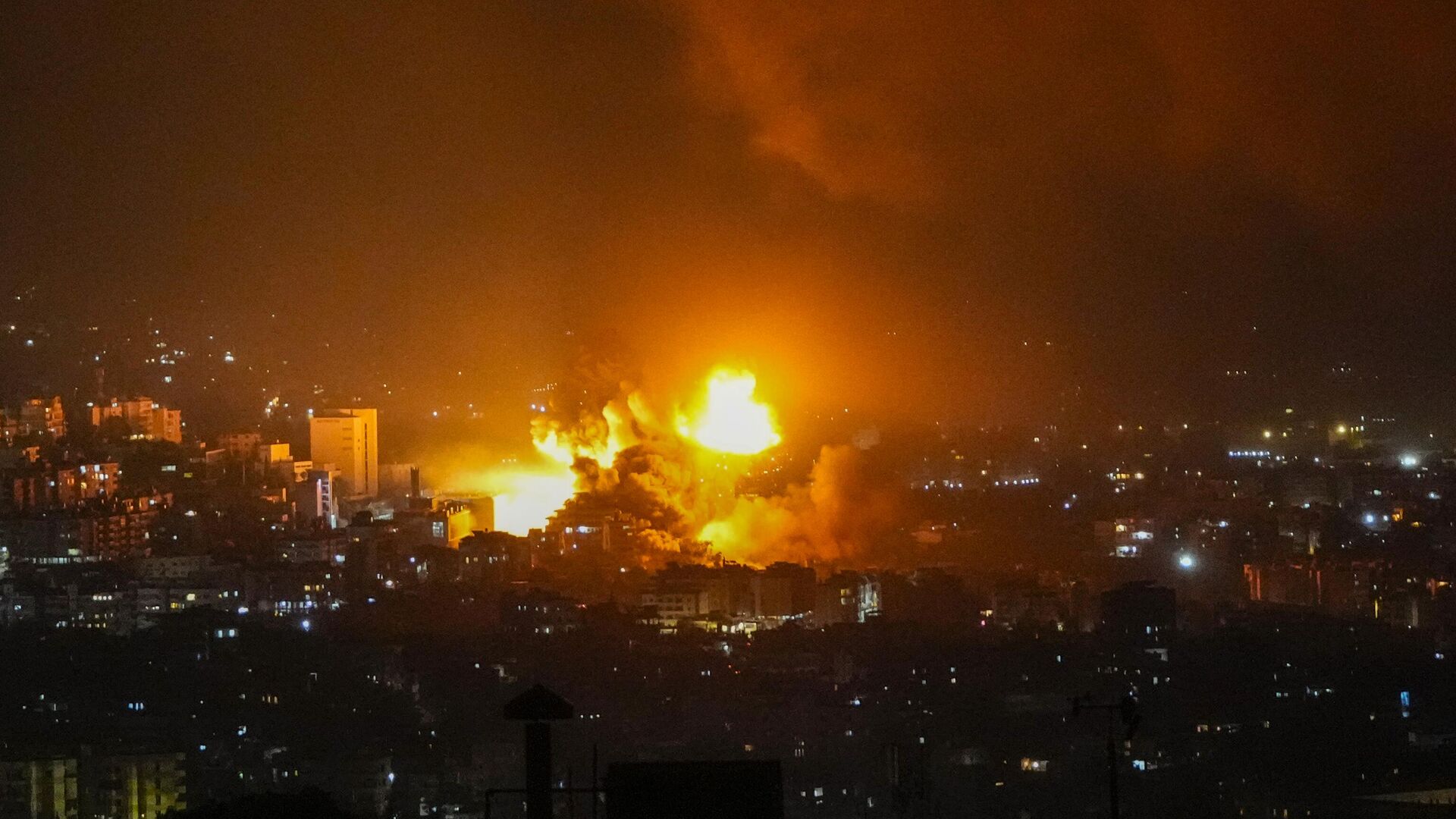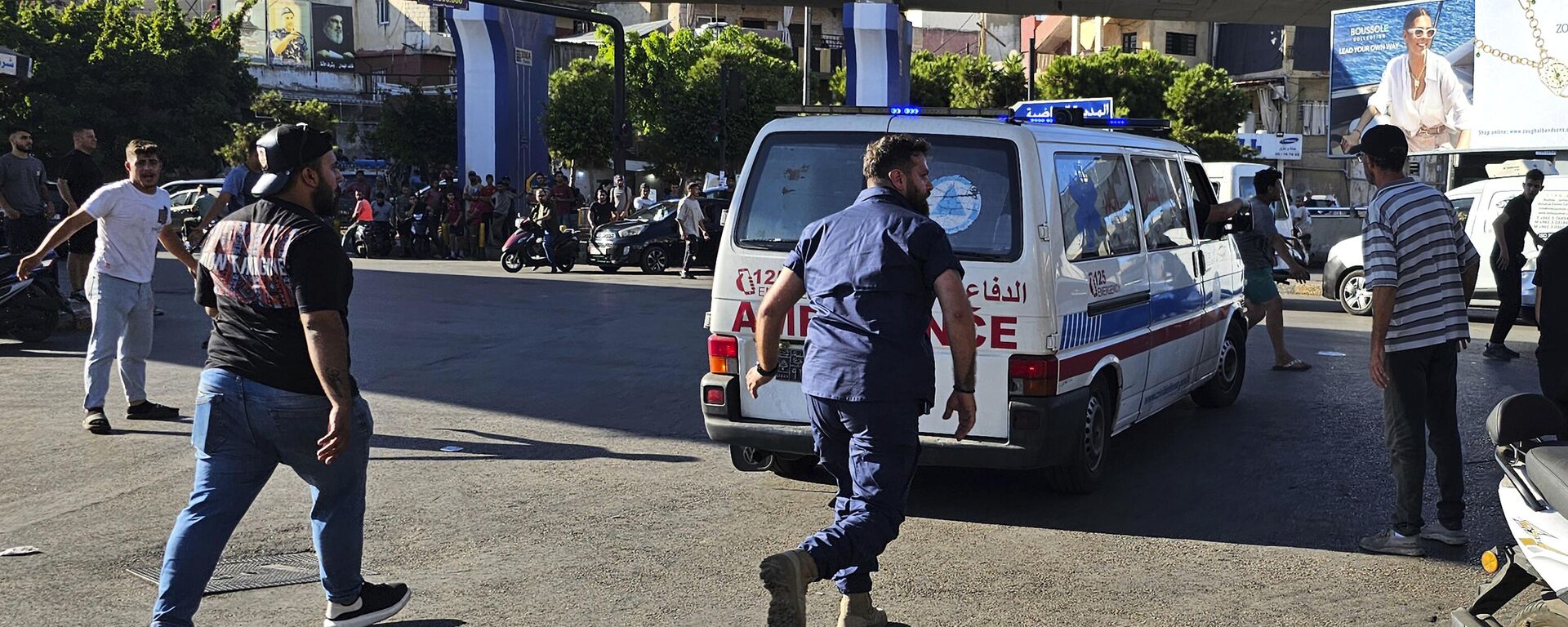https://sputniknews.in/20240930/middle-east-crisis-escalation-may-put-india-at-risk-opinion-8220298.html
Middle East Crisis Escalation May Put India at Risk: Opinion
Middle East Crisis Escalation May Put India at Risk: Opinion
Sputnik India
India has distanced itself from the escalating tensions in the Middle East, notably refraining from commenting on the killings of Hezbollah leader Hassan... 30.09.2024, Sputnik India
2024-09-30T23:16+0530
2024-09-30T23:16+0530
2024-10-03T15:00+0530
sputnik opinion
israel
india
iran
hezbollah
houthis
hamas
government of india
ministry of external affairs (mea)
ministry of defence (mod)
https://cdn1.img.sputniknews.in/img/07e8/09/1e/8220203_0:160:3072:1888_1920x0_80_0_0_fc05dfd7c9699ac1bc13076ffad7ad3a.jpg
Following Israel's assassination of Hezbollah leader Hassan Nasrallah on Friday, Tel Aviv has bombed Yemen and Lebanon including central Beirut.Lebanon’s health ministry reported that over 100 people were killed by Israeli air raids on Sunday, with a total of more than 1,000 fatalities and 6,000 injuries in the past two weeks.India's greatest concern is the closure of the Red Sea trade route by the Yemeni armed forces since 2023 in a bid to force Israel to end its assault on the besieged Gaza Strip.India is navigating a delicate balance in its relations with Yemen's ally Iran on one side and Saudi Arabia and the UAE, which, along with other states, have been conducting economic isolation and airstrikes in Yemen since 2015.Economic concerns at the forefront due to its substantial oil needs and significant Indian diaspora in those countries, while also managing its increasing defence and trade ties with Israel, complicating the overall situation, the military pundit added.Iran is considered a near-nuclear power by Western powers, despite its supreme leader Ayatollah Ali Khamenei repeatedly declaring nuclear weapons blasphemous. Should Tehran feel threatened by attacks on its proxies, the risk of it gaining nuclear capabilities could significantly heighten tensions, Singh speculated.Any further escalation in the conflict carries serious geopolitical implications that impact India, the region and the world, the experts added.Meanwhile, at least four people were killed by Israeli airstrikes on Yemen on Sunday with Israeli Defence Minister Yoav Gallant asserting that "no place is too far" for Israeli forces.The Israeli Defence Forces claimed their attacks targeted numerous sites including power plants, and the sea ports of Ras Isa and Al Hodeidah — the besieged country's only route for food imports.Both Hezbollah and Yemen's Ansar Allah-led government have consistently stated they will continue military action until Israel declares a ceasefire and ends the ongoing humanitarian crisis in Gaza, the ambassador added.If Israel persists in its extensive attacks on Gaza and Lebanon, it is unrealistic to expect other groups to stay passive, as such actions undoubtedly contribute to regional instability, he stressed.Yemeni forces have caused 90 percent of global shipping that used to pass through the Red Sea and Suez Canal to be rerouted around the Cape of Good Hope, increasing costs and insurance rates for global shipments, which in turn contributes to global inflation, Ahmed noted.The 'international community' should focus on achieving a ceasefire instead of condoning Israel’s actions, he added, noting that “it’s crucial to highlight that Israel's aggression and the mass killings it has perpetrated are the primary drivers of regional instability.”Israel, committed to prolonging armed conflict, has consistently escalated the crisis with support of the United States, Ahmed said.The US Department of Defence claimed two airstrikes in Syria on Sunday resulted in the deaths of 37 militants associated with the Islamic State* and an Al-Qaeda*-linked group, including two senior figures.Recent US strikes in Syria are aimed at strengthening its military presence there — without approval from the government — allowing Israel to escalate the conflict while deterring Iranian retaliation, the expert stated.Despite strong economic ties in the Middle East, India has condemned the recent Hamas attack and has also stressed the importance of minimizing civilian casualties, pursuing a ceasefire, and working towards a viable Palestine State, retired Colonel Rajeev Agarwal, a West Asia expert told Sputnik India.India has supported Israel in its battle against terrorism while simultaneously advocating for an early conclusion to the war, a halt to civilian casualties, and the establishment of a viable Palestinian state, consistently calling for restraint, de-escalation, and a peaceful resolution through dialogue and diplomacy, Agarwal stressed.But when Israel sought artillery shells during the initial phase of its offensive on the Gaza Strip, India chose not to supply them for political reasons, according to a defence source quoted by The Hindu. Many regional countries appreciate this stance, the expert added.He believes India needs to take a more proactive role in resolving the Middle East crisis.But Singh asked why terrorists was condoned even when it involves violating another country's sovereignty, as seen in the Israel-Lebanon context, while there was outrage over unproven claims India was behind the 2023 killing of Sikh Khalistani separatist Hardeep Singh Nijjar in Canada.*Terrorist organisations banned in Russia
https://sputniknews.in/20240918/israels-pager-attack-exposes-risks-of-relying-on-foreign-tech-8166055.html
israel
india
iran
strait of hormuz
middle east
red sea
palestine
lebanon
yemen
syria
Sputnik India
feedback.hindi@sputniknews.com
+74956456601
MIA „Rossiya Segodnya“
2024
Swapna Nair
https://cdn1.img.sputniknews.in/img/07e7/09/12/4320104_0:0:681:681_100x100_80_0_0_ca8a7d4d582609272840ffdd1cde7278.jpg
Swapna Nair
https://cdn1.img.sputniknews.in/img/07e7/09/12/4320104_0:0:681:681_100x100_80_0_0_ca8a7d4d582609272840ffdd1cde7278.jpg
News
en_IN
Sputnik India
feedback.hindi@sputniknews.com
+74956456601
MIA „Rossiya Segodnya“
Sputnik India
feedback.hindi@sputniknews.com
+74956456601
MIA „Rossiya Segodnya“
Swapna Nair
https://cdn1.img.sputniknews.in/img/07e7/09/12/4320104_0:0:681:681_100x100_80_0_0_ca8a7d4d582609272840ffdd1cde7278.jpg
israel, india, iran, hezbollah, houthis, hamas, government of india, ministry of external affairs (mea), ministry of defence (mod), strait of hormuz, cross-border terrorism, middle east, red sea, palestine, palestinian cause, lebanon, yemen, syria
israel, india, iran, hezbollah, houthis, hamas, government of india, ministry of external affairs (mea), ministry of defence (mod), strait of hormuz, cross-border terrorism, middle east, red sea, palestine, palestinian cause, lebanon, yemen, syria
Middle East Crisis Escalation May Put India at Risk: Opinion
23:16 30.09.2024 (Updated: 15:00 03.10.2024) India has distanced itself from the escalating tensions in the Middle East, notably refraining from commenting on the killings of Hezbollah leader Hassan Nasrallah and a senior IRGC commander. However, the escalation of the ongoing crisis may have dangerous consequences for India and the whole world, the experts have said.
Following Israel's assassination of Hezbollah leader Hassan Nasrallah on Friday, Tel Aviv has bombed Yemen and Lebanon including central Beirut.
Lebanon’s health ministry reported that over 100 people were killed by Israeli air raids on Sunday, with a total of more than 1,000 fatalities and 6,000 injuries in the past two weeks.
“Conflicts are becoming more drawn-out and frequent, ushering in a period of ongoing turmoil; for India, this primarily affects oil supplies and trade due to regional tensions,” retired Major General Jagatbir Singh, a distinguished fellow at the United Service Institution (USI), stressed.
India's greatest concern is the closure of the Red Sea trade route by the Yemeni armed forces since 2023 in a bid to force Israel to end its assault on the besieged Gaza Strip.
India is navigating a delicate balance in its relations with Yemen's ally Iran on one side and Saudi Arabia and the UAE, which, along with other states, have been conducting economic isolation and airstrikes in Yemen since 2015.
Economic concerns at the forefront due to its substantial oil needs and significant Indian diaspora in those countries, while also managing its
increasing defence and trade ties with Israel, complicating the overall situation, the military pundit added.
Iran is considered a near-nuclear power by Western powers, despite its supreme leader Ayatollah Ali Khamenei repeatedly declaring nuclear weapons blasphemous. Should Tehran feel threatened by attacks on its proxies, the risk of it gaining nuclear capabilities could significantly heighten tensions, Singh speculated.
“If current disputes are not resolved quickly, the West Asia region is likely to remain unstable, potentially leading to conditions that could negatively impact India’s interests, particularly in the Gulf,” Talmiz Ahmad, a former Indian ambassador to various Middle Eastern countries, told Sputnik India.
Any further escalation in the conflict carries serious geopolitical implications that impact India, the region and the world, the experts added.
Meanwhile, at least four people were killed by Israeli airstrikes on Yemen on Sunday with Israeli Defence Minister Yoav Gallant asserting that "no place is too far" for Israeli forces.
The Israeli Defence Forces claimed their attacks targeted numerous sites including power plants, and the sea ports of Ras Isa and Al Hodeidah — the besieged country's only route for food imports.
Israel's actions raise concerns that the Bab el-Mandeb, a vital trade chokepoint, and the sea lines of communication could face immediate impacts, Ahmad said.
Both Hezbollah and Yemen's Ansar Allah-led government have consistently stated they will continue military action until Israel declares a ceasefire and ends the ongoing humanitarian crisis in Gaza, the ambassador added.
If Israel persists in its extensive attacks on Gaza and Lebanon, it is unrealistic to expect other groups to stay passive, as such actions undoubtedly contribute to regional instability, he stressed.
Yemeni forces have caused 90 percent of global shipping that used to pass through the Red Sea and Suez Canal to be rerouted around the Cape of Good Hope, increasing costs and insurance rates for global shipments, which in turn contributes to global inflation, Ahmed noted.
The 'international community' should focus on achieving a ceasefire instead of condoning Israel’s actions, he added, noting that “it’s crucial to highlight that Israel's aggression and the mass killings it has perpetrated are the primary drivers of regional instability.”
Israel, committed to prolonging armed conflict, has consistently escalated the crisis with support of the United States, Ahmed said.
The US Department of Defence claimed two airstrikes in Syria on Sunday resulted in the deaths of 37 militants associated with the Islamic State* and an Al-Qaeda*-linked group, including two senior figures.
Recent US strikes in Syria are aimed at strengthening its military presence there — without approval from the government — allowing Israel to escalate the conflict while deterring Iranian retaliation, the expert stated.
“It’s a troubling situation where the US shows unwavering backing for what has become a rogue state, one that operates beyond American control,” Ahmad said. “The US administration appears paralyzed, allowing Netanyahu to assert dominance over the American president.”
Despite strong economic ties in the Middle East, India has condemned the recent Hamas attack and has also stressed the importance of minimizing civilian casualties, pursuing a ceasefire, and working towards a viable Palestine State, retired Colonel Rajeev Agarwal, a West Asia expert told Sputnik India.
India has supported Israel in its battle against terrorism while simultaneously advocating for an early conclusion to the war, a halt to civilian casualties, and the establishment of a viable Palestinian state, consistently calling for restraint, de-escalation, and a peaceful resolution through dialogue and diplomacy, Agarwal stressed.
But when Israel sought artillery shells during the initial phase of its offensive on the Gaza Strip, India chose not to supply them for political reasons, according to a defence source quoted by The Hindu. Many regional countries appreciate this stance, the expert added.
He believes India needs to take a more proactive role in
resolving the Middle East crisis.
But Singh asked why terrorists was condoned even when it involves violating another country's sovereignty, as seen in the Israel-Lebanon context, while there was outrage over unproven claims India was behind the 2023 killing of Sikh Khalistani separatist Hardeep Singh Nijjar in Canada.
“This highlights the visible double standards between the West and the rest of the world,” he said.
*Terrorist organisations banned in Russia



